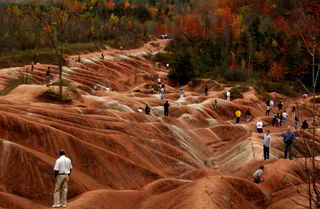Environment
When You Trample Nature For the Sake of a Selfie, You Lose.
Yielding to digital habits undermines the psychological benefits of nature.
Posted July 11, 2019

As screens continue to take over our lives as though they were an alien infection from the mind of HP Lovecraft, a paradoxical interest in natural panoramas has emerged among the selfie crowd. More and more people are visiting places like the Colorado River, the Grand Canyon, and remote vistas far off the beaten path.
But as The Wall Street Journal reports, most of the increase is due to visitors hungry for exquisite shots with which to impress their digital followers [1]. The hunt for Instagrammable grand vistas has caused an uptick in local tourism and crowds that small towns aren’t equipped to handle. But it has also put these status seekers in peril—all for the chance of being click-worthy.
When Selfies Kill
I previously wrote about how the competition for brag-worthy selfies kills more people than shark attacks do. Reckless “extreme selfie-takers” have fallen into volcano pits, been killed by oncoming trains, electrocuted themselves, and gotten gored after foolishly getting too close to wild bison. Some selfie takers appear to care more about polishing their ego than courting a violent death.
While commandeering pastoral landscapes for social media backdrops doesn’t pose much risk in itself, the focus on boosting one’s profile may make people less attuned to simply enjoying a splendid setting in a mindful way. It undermines the positive benefits that feeling one with nature can bestow, even the simplest joy of luxuriating in beautiful surroundings.
Screen addiction has become sufficiently problematic that National Geographic in Washington DC tried splitting up sidewalks outside its headquarters into lanes marked “no cellphones” and “cellphones: walk at your own risk” in order to prevent pedestrian pile ups. Many people stopped and blocked the lanes while taking a picture of the stencils, causing pileups.
No Time to Soak in Nature
Spending time in natural settings such as parks, lakes, forests, and mountains initially seemed to be a balm for digital distractions, and studies show that regularly engaging with the outdoors substantially reduces activity in the brain’s prefrontal areas that trigger rumination and a constant parade of negative thoughts. Writing in The Atlantic, pediatrician James Hamblin notes that children with ADHD who regularly play outdoors tend to have milder symptoms, and that drug addicts who participate in more communal outdoor activities than control groups enjoy lower rates of relapse [2].
How can you fully take in the flora, fauna, and natural sunlight if you keep going back to a tiny screen to see if people like you or not? “Digital tourism” illustrates the power of FOMO (fear of missing out) in which the anxiety over not being acknowledged with likes, views, or comments can compel a person into behavior not dissimilar from drug addiction [3]. Even if we want to unplug when outdoors, our survivalist desire to be constantly connected to our digital tribe is too strong. In fact, many people experience bouts of anxiety after being away from their phones (called nomophobia) for as little as 10 minutes. They never give themselves the opportunity to experience nature’s physiological benefits [4].

Wholeheartedly giving ourselves to natural surroundings can divorce us from our egos by letting us feel our smallness in the face of a vast universe. Compulsive selfie taking makes the experience all about us, and mother earth just another Instagram filter. Pretending we are Annie Liebowitz while standing over a Grand Canyon cliff at sunset could be a surefire way to boost our social media following. Yet what good will it do if we end up plummeting 6,093 feet, taking last minute photos for our followers all the way down?
E-mail comments to neuroman@gwu.edu.
References
Carlton, J., Instagram turns Obscure US Signts in Social-Media Destinations. Wall Street Journal, June 6, 2019.
Hansen, M.M., R. Jones, and K. Tocchini, Shinrin-yoku (forest bathing) and nature therapy: a state-of-the-art review. International journal of environmental research and public health, 2017. 14(8): p. 851 ff
Boumosleh, J.M. and D. Jaalouk, Depression, anxiety, and smartphone addiction in university students-A cross sectional study. PLoS one, 2017. 12(8)
Williams, F., The nature fix: why nature makes us happier, healthier, and more creative. 2017, New York: W.W. Norton & Company


